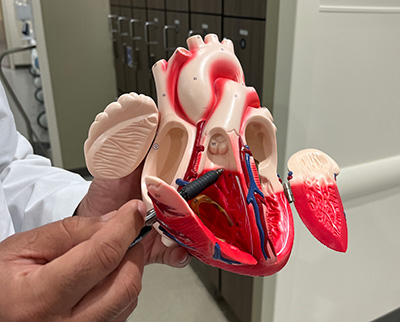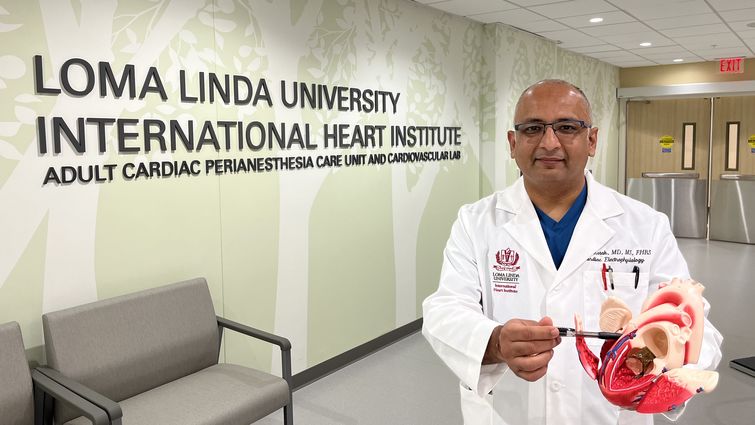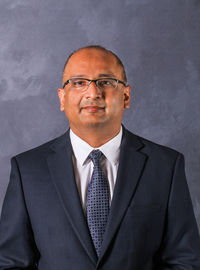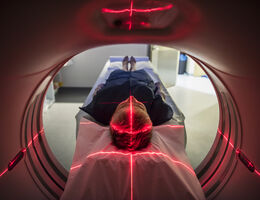

Cardiac electrophysiologist Kamal Kotak, MD, holds a three-dimensional model of a human heart, an organ that channels electricity through its cardiac conduction system.
If your heart feels like it skips beats, it is important to understand what the sensation may signal and how to check up on your heart health, says Kamal M. Kotak, MD, a cardiac electrophysiologist at Loma Linda University International Heart Institute. Kotak outlines the basics of skipped heartbeats and the importance of seeking medical care to pursue proper treatment if needed.
"Skipped heartbeats can be of minimal significance, or they may flag a potential heart rhythm issue that may require further evaluation," he says. "To find out, the first step you should take is to get it checked out by a doctor.”
How do skipped heartbeats happen?
Your heart is a four-chambered muscular pump that runs on its own electrical system, the cardiac conduction system. The system works like your own natural pacemaker and sends electricity flows from top of the heart to the bottom in an orderly fashion, Kotak says. He says any heart muscle cell can fire electricity out of order, generating a signal we feel as a skipped heartbeat. These can sometimes be precipitated in normal hearts for no apparent reasons. Otherwise, some causes may include viral infections, sleep apnea, or underlying heart disease.
He says skipped beats can also be detected during routine medical checkups or an electrocardiogram, even when patients feel no symptoms at all. For patients who do feel symptoms, Kotak says they often describe the sensation of skipped beats, fluttering, heart racing, or palpitations.
Read: COVID-19 can affect the way your heart beats — here’s what to look out for
Additionally, patients may also feel symptoms like fatigue, dizziness, confusion, light-headedness, and breathlessness, which can spark fear and panic. Kotak says the best course of action is to raise your concern to your healthcare provider.
“Many patients panic from skipped heartbeats because they can’t catch a breath, they feel like they’re going to have a heart attack, or their heart is going to stop.” Kotak says. "But skipped beats do not cause heart attacks. I want to reassure them to remain calm because they can get it checked out by their healthcare provider, who will help find out whether there is anything of concern happening with the heart and what to do next.”
Why should I seek medical attention if I feel skipped heartbeats?
In some patients, Kotak says skipped heartbeats can occur in entirely normal hearts and may not affect the heart unusually. In other cases, skipped heartbeats may signal an underlying disease of the heart or lead to the weakening of the heart muscle.
For instance, skipped beats originating from the heart’s top chamber (atrium) — also known as premature atrial contractions (PACs) — could signify a future arrhythmia, a condition characterized by irregular heart rhythm. One such rhythm is known as atrial fibrillation.
Read: Atrial fibrillation awareness: living with an abnormal heart rhythm
Skipped or premature beats from the lower chambers of the heart (ventricle) are known as premature ventricular contractions (PVCs). Kotak says recognizing and treating such conditions are essential since they can significantly impact quality of life and bear implications for heart health.
“A whole spectrum of things can happen from skipped beats,” he says. “The most common scenario is usually nothing serious. The best way to ensure that it is to get it evaluated.”
What can I expect from a medical visit?

Kotak indicates a common area for heart cells to "misfire."
First, you and your physician must accurately characterize your symptoms to establish a correlation with symptoms. Kotak says it is important not to disregard symptoms on the account that you believe you are getting out of shape or that it is just anxiety. Regardless of what you suspect, he says it is always better to have a physician examine your symptoms.
Kotak says the first step in evaluation involves undergoing some simple noninvasive tests during your visit, such as an electrocardiogram (EKG or ECG). Additional tests include echocardiogram — an ultrasound of the heart — to ensure that the heart’s structure and pumping function is normal. Another important test is a heart monitor, he says, which is like a mini-EKG resembling a sticker placed on the chest for several days (at times up to 30 days) to monitor the overall heart rhythm’s health. Kotak says the heart monitor tells the doctor what percentage of total heartbeats are skipped beats.
Read: Using smart wearables to your heart’s advantage
He says a PVC that reaches double digit percentages, for instance, can sometimes cause your heart muscle to weaken over time if not properly treated, leading to more severe conditions. Alternatively, he says PVC could be merely reflection of what is happening with the heart due to underlying heart disease.
Kotak recommends using smart devices for heart monitoring if you feel recurrent symptoms and bringing results to your healthcare provider.
What are the next steps after a medical visit?
After reviewing results, your doctor may simply determine that the skipped issues is a relatively minor problem and just needs to be periodically monitored. Other times, he says further evaluation and treatment is needed.
“Most of the time, I’m able to send patients home with no worries and provide them with that ease of mind,” Kotak says. “Other times, I find the location of the cells in the heart causing the skipped beats, and treat them.”
There are many ways skipped heartbeats can be handled, he says. Management ranges from lifestyle changes and sleep apnea evaluation to medication and more. Advanced treatment options for PVCs include heart rhythm medications or at times a procedure known as ablation. During this minimally invasive, same-day discharge procedure, a heart rhythm specialist uses very specialized tools to treat the heart cells that are firing extra electricity and causing skipped beats.
“Each patient and scenario is different, so it is not possible to generalize the evaluation and management of PVCs,” Kotak says. “The best way is to get it checked so that you know for sure that you have nothing to worry or further evaluation is needed.”
Loma Linda University International Heart Institute care teams are committed to providing patients with compassionate, comprehensive, and personalized cardiovascular care. To learn more, please visit lluh.org/heart-vascular or call 1-800-468-5432 to make an appointment.
Meet Our Providers
Kamal M. Kotak
Cardiac electrophysiologist
Specialties: Clinical Cardiac Electrophysiology, Cardiovascular Disease
Learn more about this provider



